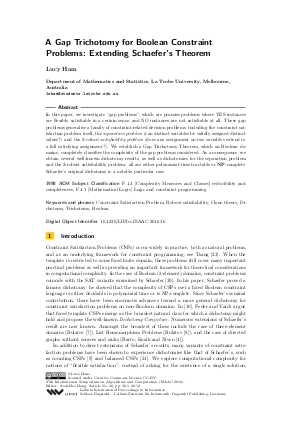A Gap Trichotomy for Boolean Constraint Problems: Extending Schaefer's Theorem
Author Lucy Ham
-
Part of:
Volume:
27th International Symposium on Algorithms and Computation (ISAAC 2016)
Part of: Series: Leibniz International Proceedings in Informatics (LIPIcs)
Part of: Conference: International Symposium on Algorithms and Computation (ISAAC) - License:
 Creative Commons Attribution 3.0 Unported license
Creative Commons Attribution 3.0 Unported license
- Publication Date: 2016-12-07
File

PDF
LIPIcs.ISAAC.2016.36.pdf
- Filesize: 0.49 MB
- 12 pages
Document Identifiers
Subject Classification
Keywords
- Constraint Satisfaction Problem
- Robust satisfiability
- Clone theory
- Dichotomy
- Trichotomy
- Boolean
Metrics
- Access Statistics
-
Total Accesses (updated on a weekly basis)
0PDF Downloads0Metadata Views
Abstract
In this paper, we investigate "gap problems", which are promise problems where YES instances are flexibly satisfiable in a certain sense, and NO instances are not satisfiable at all. These gap problems generalise a family of constraint-related decision problems, including the constraint satisfaction problem itself, the separation problem (can distinct variables be validly assigned distinct values?) and the 2-robust satisfiability problem (does any assignment on two variables extend to a full satisfying assignment?). We establish a Gap Trichotomy Theorem, which on Boolean domains, completely classifies the complexity of the gap problems considered. As a consequence, we obtain several well-known dichotomy results, as well as dichotomies for the separation problem and the 2-robust satisfiability problem: all are either polynomial-time tractable or NP-complete. Schaefer’s original dichotomy is a notable particular case.
Cite As Get BibTex
Lucy Ham. A Gap Trichotomy for Boolean Constraint Problems: Extending Schaefer's Theorem. In 27th International Symposium on Algorithms and Computation (ISAAC 2016). Leibniz International Proceedings in Informatics (LIPIcs), Volume 64, pp. 36:1-36:12, Schloss Dagstuhl – Leibniz-Zentrum für Informatik (2016)
https://doi.org/10.4230/LIPIcs.ISAAC.2016.36
BibTex
@InProceedings{ham:LIPIcs.ISAAC.2016.36,
author = {Ham, Lucy},
title = {{A Gap Trichotomy for Boolean Constraint Problems: Extending Schaefer's Theorem}},
booktitle = {27th International Symposium on Algorithms and Computation (ISAAC 2016)},
pages = {36:1--36:12},
series = {Leibniz International Proceedings in Informatics (LIPIcs)},
ISBN = {978-3-95977-026-2},
ISSN = {1868-8969},
year = {2016},
volume = {64},
editor = {Hong, Seok-Hee},
publisher = {Schloss Dagstuhl -- Leibniz-Zentrum f{\"u}r Informatik},
address = {Dagstuhl, Germany},
URL = {https://drops.dagstuhl.de/entities/document/10.4230/LIPIcs.ISAAC.2016.36},
URN = {urn:nbn:de:0030-drops-68060},
doi = {10.4230/LIPIcs.ISAAC.2016.36},
annote = {Keywords: Constraint Satisfaction Problem, Robust satisfiability, Clone theory, Dichotomy, Trichotomy, Boolean}
}
Author Details
References
-
Samson Abramsky, Georg Gottlob, and Phokion G. Kolaitis. Robust constraint satisfaction and local hidden variables in quantum mechanics. In IJCAI 2013, Proceedings of the 23rd International Joint Conference on Artificial Intelligence, Beijing, China, August 3-9, 2013, 2013.

-
Libor Barto and Marcin Kozik. Robust satisfiability of constraint satisfaction problems. In Proceedings of the 44th Symposium on Theory of Computing Conference, STOC 2012, New York, NY, USA, May 19-22, 2012, pages 931-940, 2012.

-
Libor Barto and Marcin Kozik. Constraint satisfaction problems solvable by local consistency methods. J. ACM, 61(1):3:1-3:19, 2014.

-
Libor Barto, Marcin Kozik, and Todd Niven. The CSP dichotomy holds for digraphs with no sources and no sinks (A positive answer to a conjecture of bang-jensen and hell). SIAM J. Comput., 38(5):1782-1802, 2009.

-
Adam Beacham and Joseph C. Culberson. On the complexity of unfrozen problems. Discrete Applied Mathematics, 153(1-3):3-24, 2005.

-
Andrei Bulatov, Peter Jeavons, and Andrei Krokhin. Classifying the complexity of constraints using finite algebras. SIAM J. Comput., 34(3):720-742, 2005.

-
Andrei A. Bulatov. A dichotomy theorem for constraint satisfaction problems on a 3-element set. J. ACM, 53(1):66-120, January 2006.

-
Andrei A. Bulatov. Complexity of conservative constraint satisfaction problems. ACM Trans. Comput. Logic, 12(4):24:1-24:66, July 2011.

-
Andrei A. Bulatov. The complexity of the counting constraint satisfaction problem. J. ACM, 60(5):34, 2013.

-
Tomás Feder and Moshe Y. Vardi. The computational structure of monotone monadic SNP and constraint satisfaction: A study through datalog and group theory. SIAM J. Comput., 28(1):57-104, 1998.

-
David Geiger. Closed systems of functions and predicates. Pacific J. Math., 27:95-100, 1968.

-
Oded Goldreich. On promise problems: A survey. In Theoretical Computer Science, Essays in Memory of Shimon Even, pages 254-290, 2006.

- M. Jackson. Flexible constraint satisfiability and a problem in semigroup theory. ArXiv e-prints, 2015. URL: http://arxiv.org/abs/1512.03127.
-
Peter Jeavons. On the algebraic structure of combinatorial problems. Theor. Comput. Sci., 200(1-2):185-204, 1998.

-
Peter Jeavons, David A. Cohen, and Marc Gyssens. Closure properties of constraints. J. ACM, 44(4):527-548, 1997.

-
Benoit Larose and Pascal Tesson. Universal algebra and hardness results for constraint satisfaction problems. Theor. Comput. Sci., 410(18):1629-1647, 2009.

-
R. Monasson, R. Zecchina, S. Kirkpatrick, B. Selman, and L. Troyansky. Determining computational complexity from characteristic phase transitions. Nature, 400:133-137, 1998.

-
E. L. Post. The two-valued iterative systems of mathematical logic, volume no. 5 of Annals of Mathematics studies. Princeton University Press, Princeton, 1941.

-
B. A. Romov. The algebras of partial functions and their invariants. Cybernetics, 17:157-167, 1981.

-
Thomas J. Schaefer. The complexity of satisfiability problems. In Richard J. Lipton, Walter A. Burkhard, Walter J. Savitch, Emily P. Friedman, and Alfred V. Aho, editors, Proceedings of the 10th Annual ACM Symposium on Theory of Computing, May 1-3, 1978, San Diego, California, USA, pages 216-226. ACM, 1978.

-
Henning Schnoor and Ilka Schnoor. Partial polymorphisms and constraint satisfaction problems. In Complexity of Constraints - An Overview of Current Research Themes [Result of a Dagstuhl Seminar]., pages 229-254, 2008.

-
Ilka Schnoor. The weak base method for constraint satisfaction. PhD thesis, University of Hanover, 2008.

-
Edward P. K. Tsang. Foundations of constraint satisfaction. Computation in cognitive science. Academic Press, 1993.

